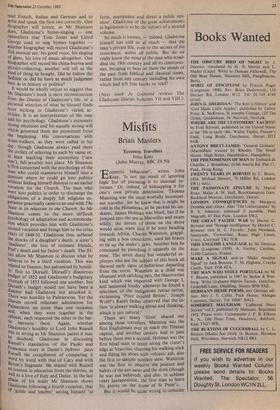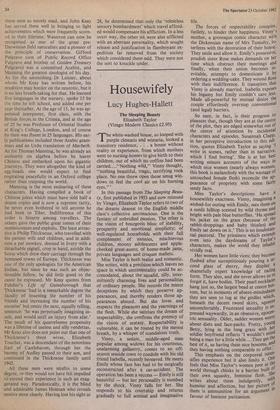Misfits
Brian Masters
Eccentric Travellers John Keay
(John Murray, BBC £9.50) ccentric behaviour', writes John -L./Keay, 'is not the result of ignoring logic but of pursuing it to unusual ex- tremes.' Or, indeed, of kidnapping it for one's own private delectation. Thomas Manning was the most woefully incompet- ent traveller, yet he knew that it might be cold in the Himalayas, so he packed his ice- skates. James Holman was blind, but if he jumped into the sea at Marseilles and swam wildly, the shouts of those on the shore would soon warn him if he were heading towards Africa. Charles Waterton, grappl- ing with a boa constrictor, used his braces to tie up the snake's jaws. Another boa he concussed by punching it squarely on the nose. The seven dotty but wonderful ex- plorers who are the subject of this book all, showed early signs of behaviour departing from the norm. Waterton as a child was obsessed with catching rats, the Hanoverian kind which was imported with George I, and lamented loudly whenever he found a specimen of the indigenous rattus rattus, exclaiming 'Poor injured Briton'. Joseph Wolff s Rabbi father observed that the in- fant 'is always walking about and thinking, which is not natural.'
There are many 'firsts' shared out among these travellers. Manning was the first Englishman ever to reach the Tibetan capital, and another century had to pass before there was a second. Holman was the first blind man to teeter along the crater's edge at Vesuvius, charring his walking-stick and filling his shoes with volcanic ash, also the first to sample monkey stew. Waterton was the first to observe the posture and habits of the ant-eater and the sloth (though he was not believed), and also, in sublime crazy juxtaposition, the first man to leave his gloves on the dome of St Peter's.
But it would be quite wrong to consider
these men as merely mad, and John Keay has served them well in bringing to light achievements which were frequently scorn- ed in their lifetime. Waterton can now be recognised as one of the great pre- Darwinian field naturalists and a pioneer of the principle of conservation. Gifford Palgrave (son of Public Record Office Palgrave and brother of Golden Treasury Palgrave) was a committed Arabist, and Manning the greatest sinologist of his day. As for the astonishing Dr Leitner, about whom Mr Keay has written before, his erudition may border on the neurotic, but it is no less breath-taking for that. He learned five languages in the nursery, spoke 15 by the time he left school, and added one per year thereafter. At the age of 15, he was ap- pointed interpreter, first class, with the British forces in the Crimea, and at the age of 25 he was Professor of Oriental Studies at King's College, London, and of course by then was fluent in 25 languages. His ear- ly publications included three Arabic gram- mars and an Urdu translation of Macbeth. As for Thomas Manning, he was already an authority on algebra before he learnt Chinese and embarked upon his gigantic journeys. They were altogether the kind of egg-heads one would expect to find cogitating peacefully in an Oxford college rather than traipsing the world.
Manning is the most endearing of these characters. Having compiled a book of Chinese jokes which must have sold half a dozen copies and is now a supreme rarity, he never even bothered to tell anyone he had been to Tibet. Indifference of this order is bizarre among travellers. The others gave the public great tomes of their reminiscences and exploits. The least attrac- tive is Philip Thicknesse, who travelled with his patient wife and children, and in addi- tion a pet monkey, dressed in livery with a detachable pigtail, crop in hand, astride the horse which drew their carriage through the bemused towns of Europe. Thicknesse was one of the only apologists for the American Indian, but since he was such an objec- tionable fellow, he did little good to the cause he espoused. Mr Keay quotes from Fulcher's Life of Gainsborough that Thicknesse 'had in a remarkable degree the faculty of lessening the number of his friends and increasing the number of his enemies' but omits the next, equally telling, sentence: 'he was perpetually imagining in- sult, and would sniff an injury from afar.' The result of his quarrelsome propensity was a lifetime of useless and silly vendettas. Mr Keay also does not point out that one of Thicknesse's three wives, Elizabeth Touchet, was a descendant of the notorious Earl of Castlehaven; through her the barony of Audley passed to their son, and continued in the Thicknesse family until 1942.
All these men were misfits to some degree, or they would not have felt impelled to extend their experience in such an exag- gerated way. Paradoxically, it is the blind and admirable James Holman who reveals motive most clearly. Having lost his sight at 28, he determined that only the 'relentless sensory bombardment' which travel afford- ed would compensate his affliction. In a less overt way, the other six were also afflicted with an aberrant personality, which sought release and justification in flamboyant ex- pedition far removed from the society which considered them odd. They were not the sort to knuckle under.











































 Previous page
Previous page